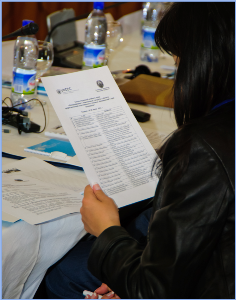Taking Stance Against HIV and AIDS
 A consultative meeting of national experts, regarding the improvement of professional standards and training programs, was been held in Azerbaijan in November. This event, conducted by UNODC, has been devoted to the discussion of achievements and programme development undertaken in the area of improving professional standards and integrating socio-medical and legal aspects of the prevention and treatment of HIV infection among injected drug users into education programmes. In particular, it has been suggested that this education should be undertaken in as part of both higher and secondary education in Azerbaijan.
A consultative meeting of national experts, regarding the improvement of professional standards and training programs, was been held in Azerbaijan in November. This event, conducted by UNODC, has been devoted to the discussion of achievements and programme development undertaken in the area of improving professional standards and integrating socio-medical and legal aspects of the prevention and treatment of HIV infection among injected drug users into education programmes. In particular, it has been suggested that this education should be undertaken in as part of both higher and secondary education in Azerbaijan.
The meeting's purpose was to revise activities undertaken in this field, to identify key directions for intervention through education, and to prepare a regional seminar which will create a training manual for higher education teachers. The meeting was attended by a variety of key partners from various governmental, NGO and educational organisations in Azerbaijan, including relevant ministries, the Institute of Public Health, the Medical University and the Azerbaijan Red Crescent Society.
This event effectively addressed a number of matters surrounding HIV, in particular the need to build capacities of care providers through education and the revision of professional standards.
A particular focus of the event was the need to address the prevalence of HIV in prisons. Kamil Salimov, a professor of the law faculty at the Baku State University, noted that of the 14 to 15 thousand people sentenced each year to imprisonment, 70% have been linked to illegal drugs. He also highlighted the importance of protecting the drug-user risk group in prison. Leyla Imanova, the Director of Health Programs at the Open Society Institution, presented information regarding the development of educational programs regarding harm reduction for penitentiary system specialists. Matanat Askervoa, a chief instructor at the Academy of Justice, has indicated that while standards have been developed for law enforcement specialists, an equivalent has not be provided to penitentiary system staff and this situation must be remedied.
A series of recommendations were established during the sessions. These included the need to develop modules for penitentiary staff to be introduced at the Academy of Justice, specifically those addressing psychiatry, dermatology, TB and pulmonary diseases. It was also determined that a training-of-trainers should be organised for staff at the Medical University concerning these four health concerns, while training manuals should be developed and introduced at the Azerbaijan State University, specifically in the chair of sociology and the law faculty. The successful fulfilment of these recommendations will lead to significant developments in the prevention of HIV/AIDS among drug users, vulnerable populations and prison inmates in Azerbaijan.